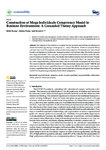Construction of Mega Individuals Competency Model in Business Environment: A Grounded Theory Approach
| dc.contributor.author | Huang, B | |
| dc.contributor.author | Zhang, Jinhua | |
| dc.contributor.author | Li, X | |
| dc.date.accessioned | 2023-01-30T11:35:33Z | |
| dc.date.available | 2023-01-30T11:35:33Z | |
| dc.date.issued | 2022-07-28 | |
| dc.identifier.issn | 2071-1050 | |
| dc.identifier.issn | 2071-1050 | |
| dc.identifier.other | ARTN 9248 | |
| dc.identifier.uri | http://hdl.handle.net/10026.1/20215 | |
| dc.description.abstract |
<jats:p>The purpose of this research is to explore the new practices derived from the influences of information technology among a certain group, i.e., “mega individuals”. Based on Grounded Theory and interviews from 53 companies, which consist of responses from 56 domestic and international founders, entrepreneurs, professional managers, partners and business elites, this study expounds that “mega individuals”, who constantly develop individual attainment and ability under the influence of business ecosystem evolution, have broken the traditional employment relationship. Through Grounded Theory, the following conclusion can be drawn: “mega individuals” are composed of three key traits: compound ability, collaboration ability and personal intellectual property (IP) know-hows. This research takes the initiative to create the “mega individuals competency model” (MICM) and elaborates on the dynamic capabilities theory to interpret the MICM, dedicated to enriching the dynamic capabilities theory by merging the current rapid and continuous changes in the business world from the promising and potential individual’s perspective.</jats:p> | |
| dc.format.extent | 9248-9248 | |
| dc.language | en | |
| dc.language.iso | en | |
| dc.publisher | MDPI AG | |
| dc.subject | mega individuals | |
| dc.subject | competency model | |
| dc.subject | dynamic capabilities | |
| dc.subject | compound ability | |
| dc.subject | collaboration ability | |
| dc.subject | personal intellectual property | |
| dc.title | Construction of Mega Individuals Competency Model in Business Environment: A Grounded Theory Approach | |
| dc.type | journal-article | |
| dc.type | Journal Article | |
| plymouth.author-url | https://www.webofscience.com/api/gateway?GWVersion=2&SrcApp=PARTNER_APP&SrcAuth=LinksAMR&KeyUT=WOS:000840197800001&DestLinkType=FullRecord&DestApp=ALL_WOS&UsrCustomerID=11bb513d99f797142bcfeffcc58ea008 | |
| plymouth.issue | 15 | |
| plymouth.volume | 14 | |
| plymouth.publication-status | Published online | |
| plymouth.journal | Sustainability | |
| dc.identifier.doi | 10.3390/su14159248 | |
| plymouth.organisational-group | /Plymouth | |
| plymouth.organisational-group | /Plymouth/Faculty of Arts, Humanities and Business | |
| plymouth.organisational-group | /Plymouth/Faculty of Arts, Humanities and Business/Plymouth Business School | |
| plymouth.organisational-group | /Plymouth/Users by role | |
| plymouth.organisational-group | /Plymouth/Users by role/Academics | |
| dcterms.dateAccepted | 2022-07-26 | |
| dc.rights.embargodate | 2023-1-31 | |
| dc.identifier.eissn | 2071-1050 | |
| dc.rights.embargoperiod | Not known | |
| rioxxterms.versionofrecord | 10.3390/su14159248 | |
| rioxxterms.licenseref.uri | http://www.rioxx.net/licenses/all-rights-reserved | |
| rioxxterms.type | Journal Article/Review |


